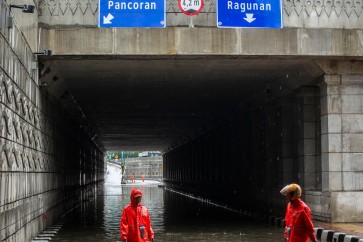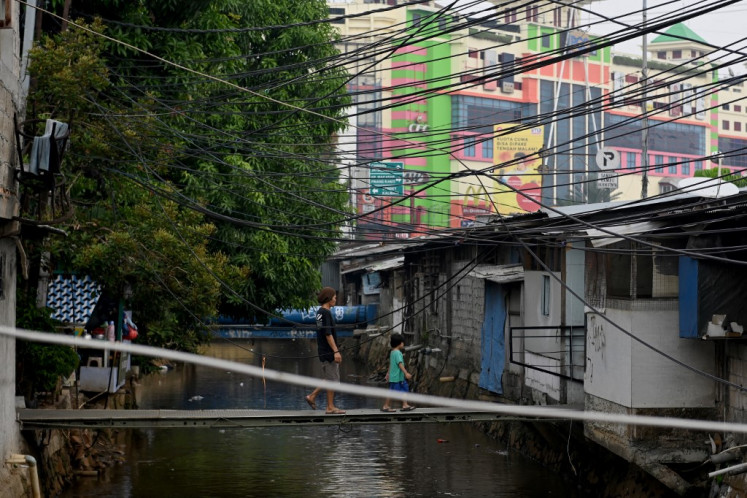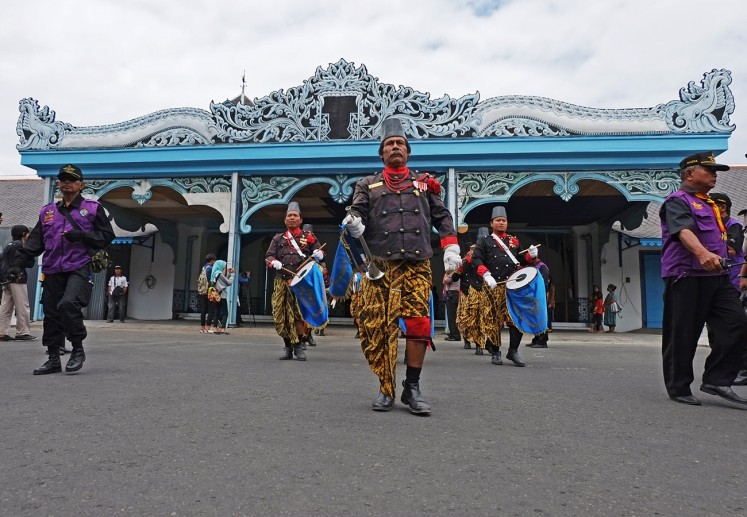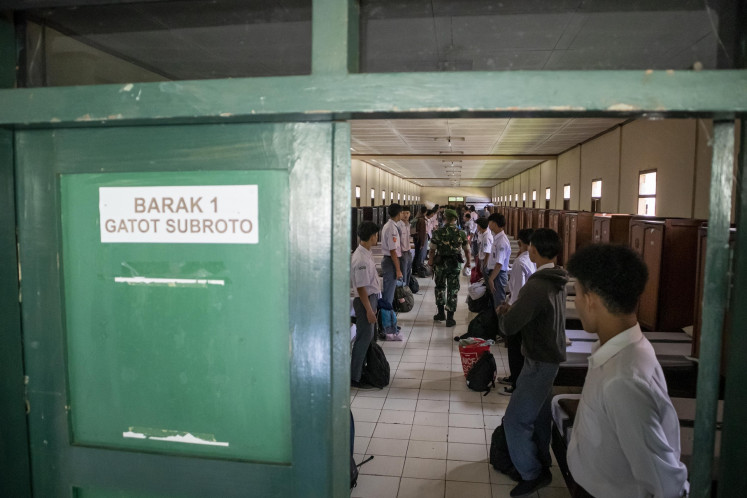One year on: Cautious optimism after slow start on infrastructure
President Joko âJokowiâ Widodoâs first year in office has seen the resumption of a number of stalled infrastructure projects, but given the high expectations created by the governmentâs initial promises, many today are less than pleased with the speed of development
Change text size
Gift Premium Articles
to Anyone

President Joko 'Jokowi' Widodo's first year in office has seen the resumption of a number of stalled infrastructure projects, but given the high expectations created by the government's initial promises, many today are less than pleased with the speed of development. Others see signs of progress.
Infrastructure is clearly at the center of Jokowi's agenda. By removing the country's burdensome and poorly targeted fuel subsidies soon after taking office, Jokowi's administration has freed up budget funds that can now be channeled into infrastructure projects. In his campaign, the former Surakarta mayor and Jakarta governor also envisioned a maritime-highway policy for the nation to ease the flow of goods, lower logistics costs and boost interconnectivity in the archipelago.
However, one year on, those projects have been progressing slowly, economists say.
DBS Bank economist Gundy Cahyadi considered the first year to be rather disappointing and said that the year-to-date realization did not match the ambitions.
'State budget disbursement was slow. We initially expected that many infrastructure projects would begin in May, but instead, they commenced late after the Idul Fitri holidays,' he said in an interview recently.
By August, the government had only disbursed Rp 90 trillion (US$6.5 billion) on infrastructure projects, which is less than a third of the budget funds allocated for that purpose. The state budget earmarks Rp 290.3 trillion for infrastructure ' the highest amount ever ' which is to be disbursed through various channels.
Economists have attributed the lackluster spending to nomenclature changes in several ministries responsible for infrastructure spending, a state budget revision and the politics behind it as well as tardy bureaucracy.
After being sworn in, Jokowi set up the new Coordinating Ministry for Maritime Affairs, which coordinates efforts between the ministries in charge of transportation, maritime issues and fisheries, energy and mineral resources as well as tourism ' all of which are seen as crucial to Jokowi's vision of turning Indonesia into a vital maritime axis.
He also merged the public works and public housing ministries into one, which is seen as one of the many reasons for slow disbursement of funds, because the approval of many projects had to be delayed until the merger was completed.
The ministry is listed as the largest recipient of state funds with Rp 118.5 trillion under the 2015 revised state budget and is tasked with developing basic infrastructure projects this year, namely dams, bridges and roads.
The Public Works and Public Housing Ministry has not even spent half of the state funds earmarked for it, as shown by its own data, dated Oct. 11, although it remains optimistic that it will disburse more than 90 percent of the targeted funds by year-end.
It launched nine new projects in 2015, including the Trans-Sumatra and Trans-Java toll roads, but most of those projects will take several more years to complete.
With less than three months left this year, Gundy said that he doubted the government could disburse all the funds and reach all objectives as targeted for 2015.
'One thing that we can learn from the one-year experience is to be ultracautious when making plans, because they can backfire when people's high expectations are not met,' he said.
The new administration has laid out its infrastructure development targets in the National Mid-Term Development Plan (RPJMN) 2015-2019.
For instance, by the end of its five-year term, the administration hopes to have constructed 28 new dams across the country to bring the total number of dams to 49. It is looking to add 35.9 gigawatts (GW) of electricity generating capacity to reach a total capacity of 86.6 GW and to reduce the housing backlog to 5 million houses by providing 2.6 million new homes.
The targets on transportation are equally bold.
According to the RPJMN, the government expects to expand the national road network to 45,592 kilometers from the previous 38,570 km, extend the length of railway tracks to 8,692 km from 5,434 km, increase the number of seaports to 450 from 278 and boost the number of airports to 252 from 237.
OCBC Bank economist Wellian Wiranto said that things were moving at a snail's pace in the first half of this year. 'Overall, I'd say that the government has achieved a score of probably around 6.5 out of 10 in terms of its agenda so far,' he wrote in an email.
'The first half of the one-year tenure appears to have been hobbled by politics and ' except for the initial spurt on fuel price reform in November 2014 ' it is only in recent months that it seems that the economic agenda took center stage, including through a reshuffle of key economic portfolios in the Cabinet,' he added.
However, not all hope is lost despite the worse-than-expected first-year performance. This year, the government did manage to complete and resume several projects that had stalled in previous years. Two notable projects that the government jump-started are the Rp 4 trillion Jatigede dam in West Java and the $4 billion coal-fired Batang power plant in Central Java.
Work on the dam, which can retain 979 million cubic meters of water, took 33 years to complete. Meanwhile, work on the 2 x 1,000 megawatt Batang power plant was finally officiated by Jokowi in August after four years of delay since the plant's tender process ended.
The move can be seen as evidence of the government's seriousness in removing bottlenecks in infrastructure projects, even though not all of the necessary land has been acquired for the plant.
'The commitment is still there, but it would be better to review the whole plans from time to time to determine their feasibility,' said Gundy.
Wellian said that he was hopeful that the pace of development would increase from here on, citing several recent data releases, including cement sales that were picking up.
'Overall, it is still going to be hard for growth to go above 5 percent this year, unfortunately, but we harbor hopes that next year should offer better prospects, especially if the pick-up in infrastructure development stays robust,' he said.
Meanwhile, Bank Internasional Indonesia (BII) economist Juniman and Standard & Poor's director of sovereign ratings Kyran Curry said legal and regulatory uncertainties remained the culprit when it came to speeding up infrastructure projects.
'Land acquisition is still a big issue due to the lack of clear regulations in the field. The government could prioritize infrastructure projects that don't involve that much land clearance to get things going faster,' Juniman said.
According to Curry, inadequate infrastructure is a key constraint for Indonesia's growth prospects. He highlighted the importance of an extensive capital investment program and further improvements in policy credibility to address the issue.
'We observe that Indonesia's developing policy and institutional settings, legal and regulatory uncertainties, bureaucratic obstacles and entrenched patronage, and slippage in implementing key policies can hamper the momentum for reforms and investor confidence,' he said. (fsu)









